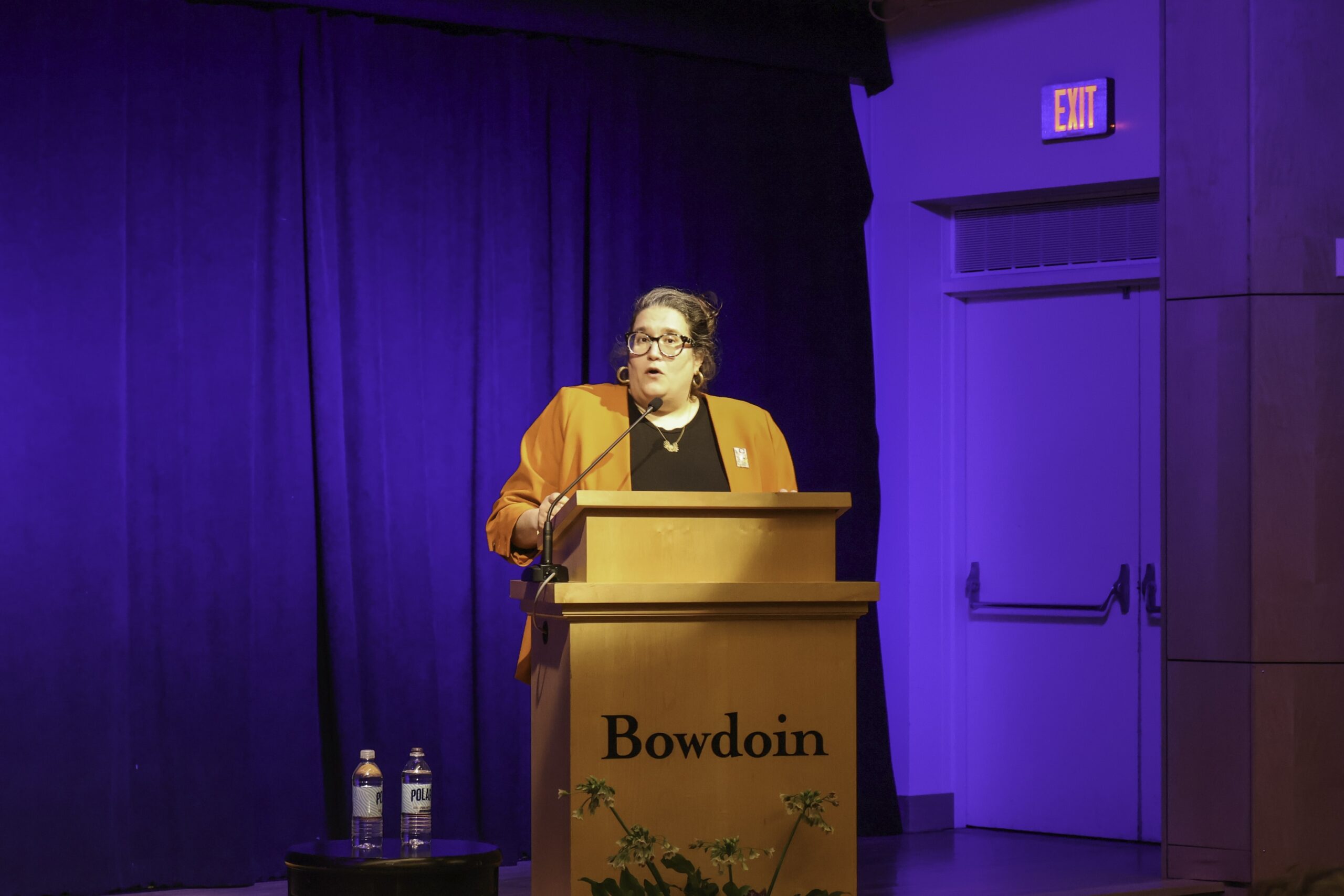Writer Carmen Maria Machado urges audacity in Kenneth V. Santagata Memorial Lecture
May 2, 2025
 Abigail Hebert
Abigail HebertOn Wednesday evening, writer Carmen Maria Machado delivered this year’s Kenneth V. Santagata Memorial Lecture. Her debut short story collection, “Her Body and Other Parties,” was a finalist for the National Book Award, and her memoir, “In The Dream House,” earned her a Lambda Literary Award.
Currently the Writer in Residence at the University of Pennsylvania, Machado’s work blends horror, humor and heartache with a fair sprinkling of erotica.
Machado first warned the audience about typos—both metaphorical and literal—in the case of misspellings.
“This is a talk I am currently calling ‘On Writing Audaciously.’ You are the first audience to hear it,” Machado said.
Machado was introduced by Assistant Professor of Latin American, Caribbean and Latinx Studies Irina Popescu and Assistant Professor of Gender, Sexuality and Women’s Studies Angel Matos.
“Machado works alongside our very basic human emotions while inspiring us to shake the foundations of identity that we think we hold steadfast,” Popescu said in her opening remarks.
Matos noted that Machado’s work has been instrumental in his own pedagogy.
“Machado’s nuanced and engaging way of using the written word to explore and represent the unrepresentable, the unspeakable and the painful, has invited my students to think carefully about the relationship between feeling, transformation and the written word,” Matos said.
Feeling, transformation and the written word were the central themes of Machado’s lecture. She focused on her process, the spiritual act of writing and a phenomenon she borrowed from Spanish poet Federico García Lorca called “duende.”
“Lorca delivered a lecture on the concept of ‘duende,’ a dark, roving, terrestrial spirit or life force that manifests in the artists who have it or encounter it: ragged, scorching, demonic, powerful, risky,” Machado said.
Machado connected this artistic force to her own writing and the creation of her famous short story “Especially Heinous,” which she wrote after a swine flu haze left her watching three days’ worth of “Law and Order: SVU.”
“I began writing what would eventually become ‘Especially Heinous,’ a massive, surreal, sprawling novella that takes one of our longest-running shows and turns it into what it is: a demented fairy tale about America and sexual violence and policing through the lens of David Lynch,” Machado said.
She says that “Especially Heinous” is her personal favorite of her own writing, despite its mixed reception.
“People have told me it’s a masterpiece. I agree, but I also have had people tell me it’s an insane story, completely unreadable. If I had a nickel for every person who told me they hated this story, I’d never have to write again,” Machado said.
Nevertheless, Machado sees the story’s contentious nature as an example of the kind of audacity and “duende” she lectures about.
“There is perhaps no greater evidence for the story’s excellence than how ridiculously divisive it is,” Machado said.
A part of that excellence, Machado said, is how she defied conventions and challenged literary rules.
“I want to break a rule that I learned I can never ever break. I want to break ten rules,” Machado said.
The lecture then expanded into a discussion of Machado’s experience as both a graduate student and a professor. In these two roles, Machado said she exhibits and encourages audacity, “duende” and rule breaking.
“I’m trying to tell you what it means to write audaciously, to write [and read] the texts of writers who make surprising, devastating, ill-advised choices and somehow make it work,” Machado said.
Once the lecture concluded, Machado took questions from the audience, ranging from further inquiries into her artistic process to the broader world of publishing.
When asked how much of herself she shares in both her fiction and nonfiction work, Machado said that her memoir felt more publicly personal.
“I actually find that with fiction, I can write a lot about myself, but there’s a little bit of a protective sort of sheath,” Machado said. “But in nonfiction, you don’t really have that option. There’s no way to move away from what you’ve written, [so] it is much more exposing, more intense.
Whether writing fiction or nonfiction, Machado emphasized the importance of self-trust during the creative process.
“I have practiced for a very long time saying out loud to myself and other people, ‘This is good.’ Or, ‘I was really on fire here.’ Or, ‘I’m really proud of myself.’ Or, ‘I really got stronger and a better writer than I was,’” Machado said.
Through “duende,” audacity and self-trust, Machado made the case for a genuinely authentic and slightly spiritual artistic process. In other words, embracing one’s art, typos and all.

Comments
Before submitting a comment, please review our comment policy. Some key points from the policy: